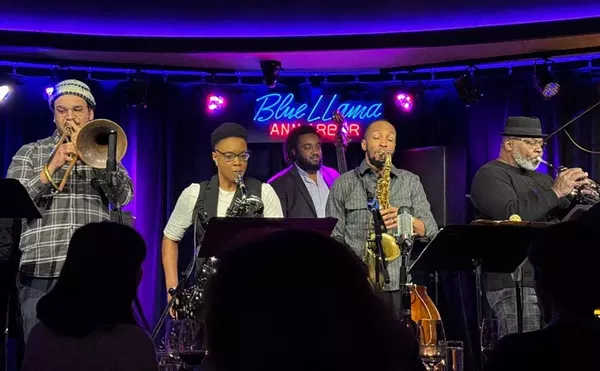You don't travel far down the family tree of vocalese to get to Jon Hendricks. Well, it's actually more of a vine of voices clinging to the trunk of instrumental jazz than a tree. But whatever you call it, you barely get started on it before you run into Hendricks — and you can’t go far enough to escape his influence.
"Yeah, there's King Pleasure, Eddie Jefferson, Annie Ross …" says Hendricks on the phone, recounting the genealogy. Then comes a showbiz pause as if he’s waiting for an interviewer to fill in "Jon Hendricks," who along with the aforementioned Ross and the here-mentioned Dave Lambert formed Lambert, Hendricks and Ross. The vocalese trio went supernova four decades ago, and there's been little to match it since. Now the past blast is echoing in the reunion of Hendricks, 79, and Ross, 70, its surviving members.
"I'm a Johnny-come-lately," Hendricks says, continuing the genealogy of his art, "but my contribution — I took it from the solo to the entire orchestral form."
Hendricks seems to relish recalling the chain of revelation and aesthetic happenstance that led to that. He was a 1950s law school dropout, a singer and songwriter who despite having penned an R&B hit still needed his clerk's job. He was in a yearlong thrall to the Woody Herman Band hit "Four Brothers," singing the theme and all four sax solos, note-for-note, as he rode the subway to work. At the same time, he was wondering how he could stretch songs ("because I'm very literary") beyond the typical 32 bars.
Then he heard "Moody's Mood for Love," in which King Pleasure sang lyrics re-creating note-for-note a sax solo James Moody once played on in "I'm in the Mood for Love."
"I said, 'Hmmm. You don't have to stop at 32 bars.'" Seeing how Pleasure (with lyrics from Jefferson) had broken the bar barrier, Hendricks plunged through the breach and convinced a producer to back his similarly lyricized "Four Brothers."
He tapped Lambert as a collaborator for the record which went nowhere but into the footnotes of jazz. A few years later, as a couple of down-on-their-luck housemates, "We decided that before we starved to death we ought to do something."
"Something" was an unswinging abomination in which 13 singers sang lyricized renditions of Count Basie hits. That wouldn't have even merited a footnote but for the way they saved their asses. Along with Annie Ross (the one keeper of the 13, who had followed King Pleasure with like-minded hits of her own such as "Twisted"), Lambert and Hendricks rerecorded everything using the new trick of overdubbing. Their three voices became 12, and Sing a Song of Basie lit up their careers.
"We went from obscurity to stardom in a month," says Hendricks. "It was incredible. There's never been anything like it."
Albums followed at a rapid clip. Columbia titled one release The Hottest New Group in Jazz. For five years they were just that — until they cracked. Ross got sick and quit. Two short-term replacements failed to click and, just as suddenly, it was over.
The other day Hendricks deflected questions about the breakup by talking about bandleader Artie Shaw who simply upped and quit the business. "He said I wanted to be a musician and I wanted to play anything that I felt like playing, and I didn't want to be a slave to any big hit that I had." Which is maybe Hendricks' way of saying the end of LHR was also an emancipation.
Ross went on to a varied career of music, theater and film (including a much-praised role in Robert Altman's Short Cuts). Lambert died in a 1966 auto accident. Hendricks continued as "the bard of bop." He collaborated with the Manhattan Transfer, for instance, on Vocalese, the group's biggest seller. He now teaches jazz and vocalese at the University of Toledo.
Two years ago he and Ross coordinated brief guest spots at each other’s Big Apple club dates. The audiences felt the electrical jolt, which led to Hendricks and Ross as an ongoing duo with plans to record again.
"It's like we were never apart," says Hendricks. "The first rehearsal — we just all of a sudden started singing all the tunes. It just came right back to us."
As have audiences: Sometimes three generations of a family wait for autographs after the show with tales of how "Centerpiece" or some tune was passed from parents to kids and kids' kids.
And after the quick flare of the original trio of twenty- and thirtysomethings, Hendricks is asked if this septuagenarian act might outlast it on the vocalese vine.
"You know," says Hendricks with a chuckle, "that's probably true."
W. Kim Heron is Metro Times managing editor. Send comments to [email protected].






